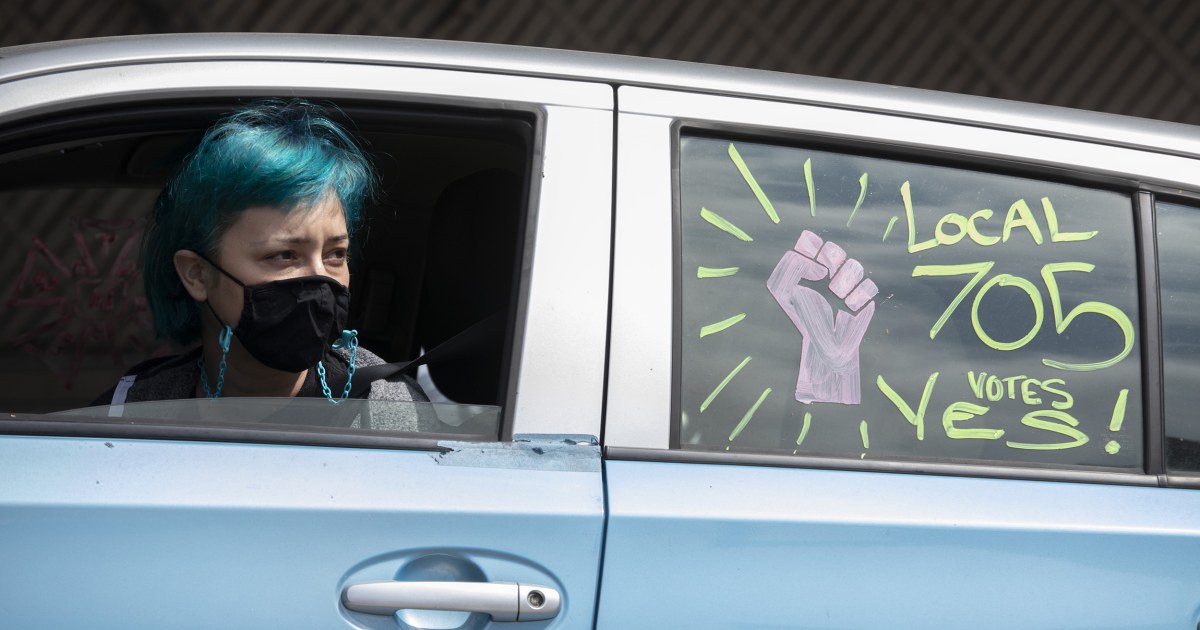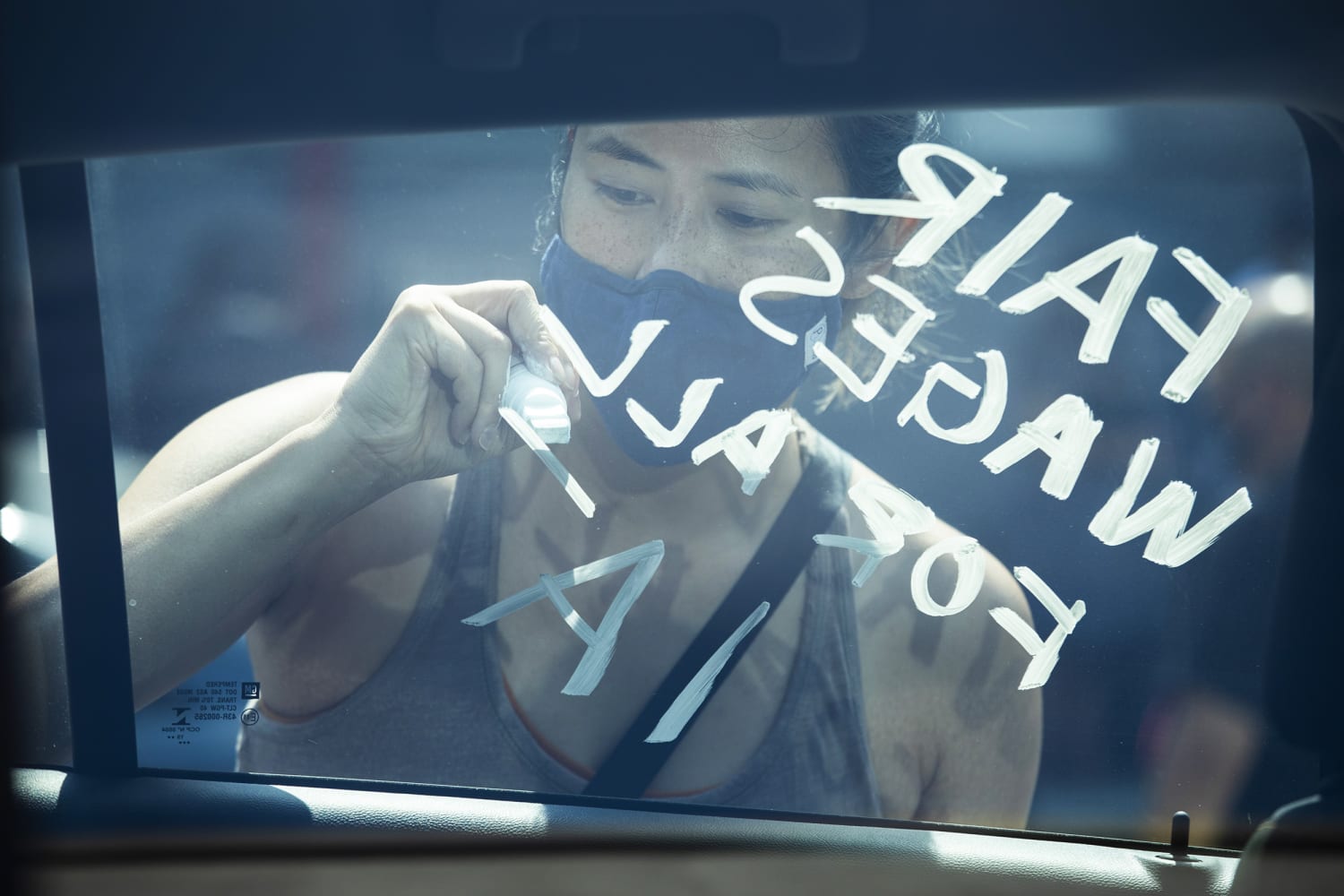
At 3 a.m. every weekday morning, Hanny Eisen wakes up to prepare school lunches for her two children. Two hours later, when the sky is still pitch-black, the single mom heads to work as a make-up artist, bouncing around various Hollywood sets to work on productions across Los Angeles.
When she walks out of her house, she doesn’t expect to step foot in it again for at least another 12 hours. She sacrifices sleep to see her children. She loses time with her children to work. She works to pay her bills.
“I can’t turn down work as a single mother,” she told NBC News. “I have to pay rent, cover insurance and support my children, so it comes with a price: I’m absent from my children’s lives, but I’m also fortunate that I have work.”
But Eisen, and thousands of other members of the International Alliance of Theatrical Stage Employees union (IATSE), say it doesn’t have to be this way.
As a member of the Make-Up Artists & Hair Stylists Guild (IATSE Local 706), Eisen has the chance to vote — starting Friday — on whether to grant IATSE’s president the authority to call a strike should talks with the Alliance of Motion Picture and Television Producers (AMPTP), which represents major film and television production companies, remain stalled.
Officially, it’s just a vote to authorize a strike, not a vote to go on strike. However, if it passes, it could lead to the biggest industry strike among Hollywood production workers since World War II. The results are expected to be released Monday, according to IATSE.
The union’s contract with AMPTP, which went into place in 2018, ended July 31 and was extended until Sept. 10. The union is calling for a new, three-year basic agreement that would provide behind-the-scenes workers higher pay, larger contributions to health and pension plans, meal breaks, improved rest periods and a bigger cut of the profits from streaming productions.
In a Sept. 21 statement announcing its intent to hold a strike authorization vote, IATSE said members “risked our health and safety all year, working through the Pandemic to ensure that our business emerged intact. Now, we cannot and will not accept a deal that leaves us with an unsustainable outcome.”
On Friday, the union’s president, Matthew Loeb, sent a letter to members encouraging them to vote yes on the authorization to strike.
“Our members deserve respect. Not just because we are the most talented, creative technicians and artisans in the world, but because we are human beings with basic human needs. We require breaks during the workday, sleep, food, a safe trip home and a little time with family or away from the job,” he wrote in the letter. “The demands of the industry must be balanced with the health and wellness of its members. The changes we seek are modest and manageable. What we seek is simply fairness.”
He added: “I urge you in the strongest possible terms to vote YES on the strike authorization. Stand together. We are strong.”
The Alliance of Motion Picture and Television Producers on Thursday said it “put forth a deal-closing comprehensive proposal that meaningfully addresses the IATSE’s key bargaining issues.”
“In choosing to leave the bargaining table to seek a strike authorization vote, the IATSE leadership walked away from a generous comprehensive package,” Jarryd Gonzales, a spokesperson for the alliance, said in an email, listing key components that included “meaningful improvements in rest periods” and “a considerable increase in minimum rates.”
‘We’re not expendable’
Eisen and others are holding out for a better contract. They believe change is long overdue in the industry.
“If we at least get more hours to get home, better benefits … we can have a family, and just have a more sustainable work-life balance,” Eisen said. “We’re not expendable; we’re humans.”
No union member’s story is the same, but many share similar woes: Late hours. No breaks while on set, sometimes not even to go to the bathroom. No rest periods in between shifts. No weekends off.
Such stories have long been shared among many within the industry. But in the past few months, members have been emboldened to share them publicly. Since August, an Instagram account “ia_stories page” has been posting hundreds of anonymous stories submitted by IATSE members from across the country.
The first post reads: “I worked 24 hrs once as a PA and nearly fell asleep on the freeway coming home in rush hour. The overtime was great bc I was poor, but I shouldn’t have to risk my life for a decent wage.”
That sentiment is echoed across many in the industry.
Caitlin Brown, a camera assistant and IATSE Local 600 member, said she feels that people behind-the-scenes have long been treated like machines.
She said she has worked up to 18- to 20-hour days, sometimes with those in charge failing to communicate when those working on production will be able to eat.
“When they don’t get fed, workers are trying to steal quick breaks, live off quick scoops of yogurt or bites of Doritos,” she said. “After that 12-hour mark, most people eventually lose their motor skills because they have worked long hours and are most often sleep-deprived.”
On set, an unspoken rule is you can’t ask when production will wrap. “It’s understood that when you show up to a production, you are there as long as they want you there,” she said.
“We’ve been under unreasonable expectations for years,” she added. “Just because it’s legal, it doesn’t mean it’s humane.”
Jamie Tunkel, a script coordinator and member of IATSE Local 871, is also familiar with long hours.
“There is the expectation that you are on call 24/7 even though that is not the job description,” Tunkel said. “It’s a lot of pressure with the expectation that at any point in time I will be available to do the work, without question or warning.”
The job has taken such a toll on Tunkel that she said she has taken “a step back.”
“It has affected my social and personal life, and it’s incredibly difficult to maintain those relationships,” she said. “This industry has exacerbated my anxiety because I can never unplug and am never off-the-clock. My brain is never not thinking about what needs to be done, even if it’s 3 a.m., and I’m sleeping. It’s a constant state of anxiety for me, and it’s not a way to live.”
Tunkel said her role is the “one of the lowest” paid, with a starting salary of about $17.64 per hour. She said she hopes the more people share their stories, the harder it will be for the people in power to ignore them.
“Everyone understands the need to work your way up, but that’s different than having a baseline,” Tunkel said. “I’m not asking for a million dollars. I’m asking for a decent quality of life.”
The pandemic had a big impact
Hollywood is no stranger to strikes.
Others have staged strikes throughout Hollywood’s history, demanding better compensation and working conditions, but there has been little precedent for a potential walkout of this scale.
The authorization vote itself is unparalleled in IATSE’s recent history, but what’s happening right now is not entirely unexpected.
For one thing, like everyone else, the union’s members were hit hard by the pandemic.
The pandemic “underscored two realities,” said Jay Tucker, who heads up the Center for Management of Enterprise in Media, Entertainment and Sports at UCLA’s Anderson School of Management.
“The uncertainty of being a worker in production when productions can get delayed and/or canceled, and the challenges of meeting peak demand when production came back full force,” he told NBC in an email. “That’s a powerful incentive to take a second look at the agreements in place and make changes that improve worker safety and create a healthier economic environment for everyone.”
The coronavirus pandemic forced almost everyone to shelter at home — leaving many with more time to sit and watch TV shows and movies right from their couch. That boost in viewership led to the largest streaming services, including Netflix, Amazon Prime Video, Hulu and HBO Max, to finish 2020 with combined U.S. subscriber numbers more than 50 percent higher than a year ago, according to a Wall Street Journal analysis.
Some IATSE members canceled their streaming services in protest of the studios before their vote Friday.
“We’ve been so obsessed about the shift in the consumer experience with the rise of streaming — and with the surging subscriber numbers on the platforms — that we don’t spend enough time looking at the downstream effects of the shift in business models,” Tucker said.
He said platforms’ “hunt for content has driven up the volume of production and its cost.” Streaming has also “driven radical reorganization of the studios by way of mergers and acquisitions.”
“The increased demand for content and the consolidation of the companies paying for it have put stresses on the ecosystem. IATSE workers have been called upon to work more hours as the number of projects continue to climb. Unfortunately, working conditions and compensation aren’t keeping up with the demand for that work. That’s the heart of the issue,” he said.
Multiple celebrities have thrown their support behind the potential strike, including the actors Mindy Kaling, Ryan Reynolds, Kerry Washington, Seth Rogen, Anna Paquin, Ben Stiller, Sarah Paulson, Fran Drescher, Jane Fonda and Lily Tomlin.
The strike vote has even captured the attention of more than a hundred members of Congress.
Rep. Adam Schiff and Sen. Alex Padilla, both California Democrats, along with 118 other members sent a letter Thursday to the president of the Alliance of Motion Picture and Television Producers urging it to work collaboratively and in good faith with Hollywood crew members.
“The key issues in this negotiation, as we’ve come to understand them, are about worker dignity and basic human necessities. We are unified in our belief in the importance of living wages, sustainable benefits, and reasonable rest periods between shifts and during the work day,” the members wrote.
“We ask that the AMPTP negotiate collaboratively with these workers to reach a fair contract and address the basic human needs that will allow them to do their jobs safely and with dignity,” they added.
The letter was also signed by a number of 2020 Democratic presidential candidates, including Sens. Bernie Sanders of Vermont, Elizabeth Warren of Massachusetts, Kirsten Gillibrand of New York and Cory Booker of New Jersey.
The union uses a delegate system that requires at least 75 percent of each local union’s members to vote in favor of the strike authorization for all delegate votes to count as a “yes,” a source familiar with the vote said.
As IATSE members cast their vote over the weekend, rallies will be held in New York City and Los Angeles in solidarity.
Behind-the-scenes workers and their advocates have already taken to the streets, painted their cars and gathered in large crowds to show their support for a potential strike.
If the vote passes and the IATSE president calls a strike, Tucker said it would be “problematic for everyone involved.”
“It would be tragic if a work stoppage disrupted the industry just as we are coming out of such a challenging year and a half,” he said. “We are talking about halting production on a huge segment of TV and film projects — not just in Hollywood but across the country. I’m confident that all the key stakeholders understand this.”
When asked how they would vote, the union members who spoke to NBC News all had the same answer: a resounding “yes.”
Regardless of the outcome, Brown said she hopes the studios and its producers meet the union’s demands.
“We bring a lot of skills to the table that bring them a lot of profit,” she said. “It’s time that they respect us as human beings who don’t have to put up with these toxic working conditions — and we’re not going to continue to.”
Wilson Wong reported from New York, and Saba Hamedy from Los Angeles.
Source: | This article originally belongs to Nbcnews.com









